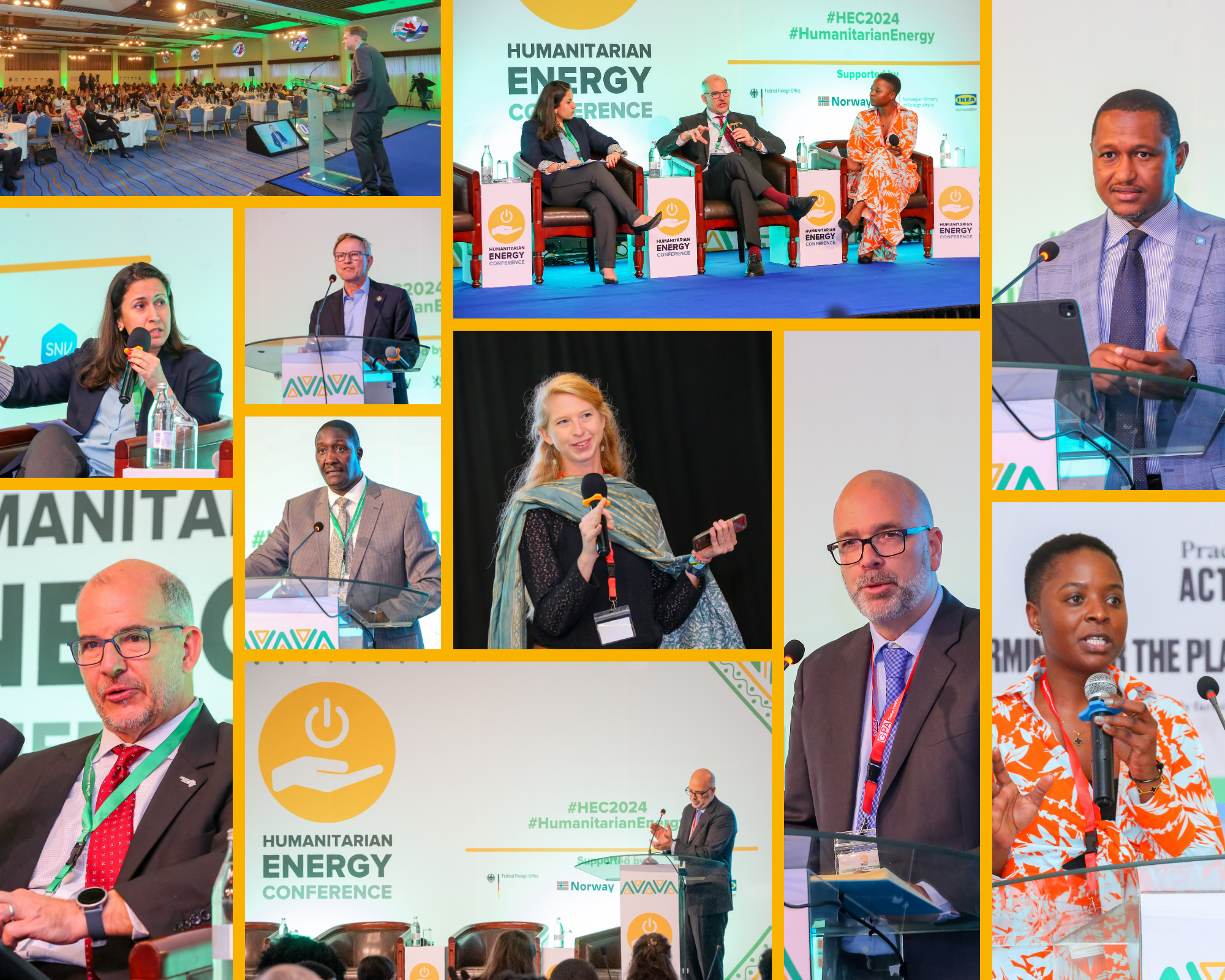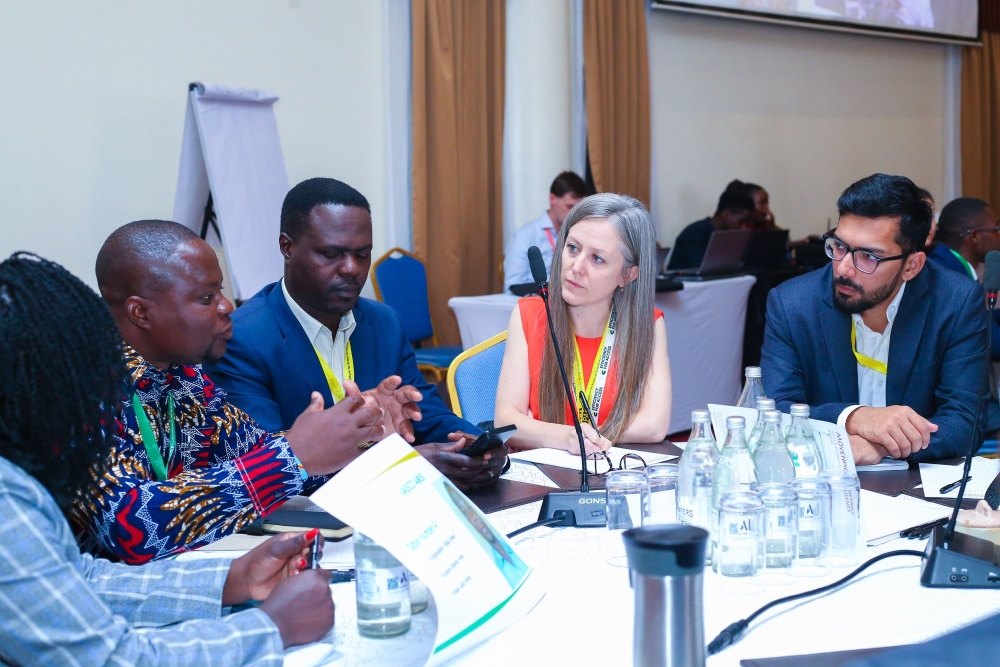In this section
In this sectionOn October 7, 2024, the third Humanitarian Energy Conference (HEC) took place in Nairobi, Kenya, bringing together over 300 people committed to accelerating the global humanitarian energy agenda. The conference aimed to foster collaboration, spark new commitments and partnerships, and mobilize resources to improve energy access for displaced populations and host communities.
Mark Gibson, Team Lead at the GPA Coordination Unit, opened the event, setting the stage for the discussions that followed. In an address, Jennifer Morgan, State Secretary and Special Envoy for International Climate Action from the Government of Germany emphasized the growing humanitarian crisis, noting that more than 120 million people are forcibly displaced today, due to conflict, violence, and climate-related disasters. Morgan emphasized that energy access is not a luxury but a fundamental need that underpins health, safety, and livelihoods. Citing the USD 10 billion gap in funding needed to meet the energy needs of displaced persons by 2030, she called for urgent action.
John Burugu, Commissioner for Refugee Affairs, Government of Kenya specified that Kenya hosts 796,331 refugees, with 83% in camps and added that "climate change poses a significant challenge in Kenya's arid and semi-arid regions", affecting both the environment and the well-being of host communities, and refugees’ dependence on firewood accelerates deforestation and promotes desertification. Mamadou Dian Balde, Director of the UNHCR’s Regional Bureau for East Africa and the Great Lakes, highlighted the key challenges to providing energy access in humanitarian settings. He pointed out that restricted funding cycles and fragmented collaboration hinder the implementation of sustainable energy solutions. Balde said, "energy can make the difference between vulnerability and dignity" for displaced people. Refugee advocate and GPA Inclusivity Advisor, Joelle Hangi, underscored the importance of including refugees in the design of energy solutions, asking the audience “are refugees involved in your work? Do they have a voice in decision-making? Can you do more?".

During a high-level panel discussion on Progress, Challenges and Vision for Humanitarian Energy in 2030, Nihan Erdogan, Deputy Regional Director for Operations at IOM, noted that climate change is becoming a primary driver of large-scale migration. Ted Lawrence, Deputy Coordinator at Power Africa, shared insights on urban displacement contexts, stating that energy access is key to integrating displaced populations into the economy in rapidly urbanizing regions. Mulualem Desta Melaku, Ethiopia’s Deputy Director General for Refugees and Returnees Services, highlighted his government’s commitment to improving access to sustainable energy for the 1.1 million refugees Ethiopia hosts and including displaced people in the National Energy Plan.
Aimee Jenks, the GPA’s Partnerships and Strategy Lead then paid tribute to Dr. Thomas Fohgrub, former Strategic Lead of GPA, who passed away in 2023. His dedication and legacy continue to inspire the work of the GPA and other partners in the humanitarian energy sector.
Over the course of the day, nine breakout sessions were held to explore major challenges, unpack solutions and exchange in-depth insights among the diverse stakeholders of the humanitarian energy community. Key themes addressed in these sessions included decarbonizing humanitarian energy, inclusivity for refugee-led businesses, energy access as an enabler of healthcare and livelihood opportunities, sustainable clean cooking delivery models, approaches to support affordability for end-users, energy in urban and IDP settings, public-private partnerships for scaling electrification, energy access for climate adaptation, and strategies for mainstreaming energy in the humanitarian response.
Following an afternoon of lively discussions, the conference participants reconvened in the plenary hall, where a diverse range of experts were asked to share impromptu reflections on the day. Per Heggenes, Special Advisor on Energy and Economic Development at UNHCR, then offered closing remarks in which he called for the humanitarian sector to move beyond providing temporary relief and toward the development of long-term funding and partnerships that support the pursuit of sustainable livelihoods in refugee communities.
Alexander Fierley, Deputy Head of Mission at the German Embassy in Nairobi, in a speech, highlighted the transformative impact of energy access for women’s safety and opportunities in refugee camps. He reiterated Germany's commitment to supporting energy access projects, echoing the call for a shift from humanitarian aid to development cooperation. Mark Gibson then closed the conference by encouraging participants to continue networking and collaborating to drive progress in the sector.
HEC 2024 served as a critical platform for stakeholders to assess progress in providing energy access to displaced populations and host communities while mapping the way forward. The conference highlighted the importance of inclusive policies, innovative financing, and public-private partnerships in achieving Sustainable Development Goal 7 for communities affected by conflict and crisis. By fostering critical dialogue and collaboration, the conference moved the humanitarian energy community closer to ensuring that displaced people have the energy resources they need to rebuild their lives and achieve long-term stability.
Read the Humanitarian Energy Conference 2024 report here.
Watch a glimpse of the event:
Last updated: 24/02/2025









